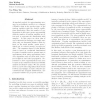Free Online Productivity Tools
i2Speak
i2Symbol
i2OCR
iTex2Img
iWeb2Print
iWeb2Shot
i2Type
iPdf2Split
iPdf2Merge
i2Bopomofo
i2Arabic
i2Style
i2Image
i2PDF
iLatex2Rtf
Sci2ools
109
click to vote
ICML
2004
IEEE
2004
IEEE
Approximate inference by Markov chains on union spaces
A standard method for approximating averages in probabilistic models is to construct a Markov chain in the product space of the random variables with the desired equilibrium distribution. Since the number of configurations in this space grows exponentially with the number of random variables we often need to represent the distribution with samples. In this paper we show that if one is interested in averages over single variables only, an alternative Markov chain defined on the much smaller "union space", which can be evolved exactly, becomes feasible. The transition kernel of this Markov chain is based on conditional distributions for pairs of variables and we present ways to approximate them using approximate inference algorithms such as mean field, factorized neighbors and belief propagation. Robustness to these approximations and error bounds on the estimates follow from stability analysis for Markov chains. We also present ideas on a new class of algorithms that iterate ...
Related Content
| Added | 17 Nov 2009 |
| Updated | 17 Nov 2009 |
| Type | Conference |
| Year | 2004 |
| Where | ICML |
| Authors | Max Welling, Michal Rosen-Zvi, Yee Whye Teh |
Comments (0)

